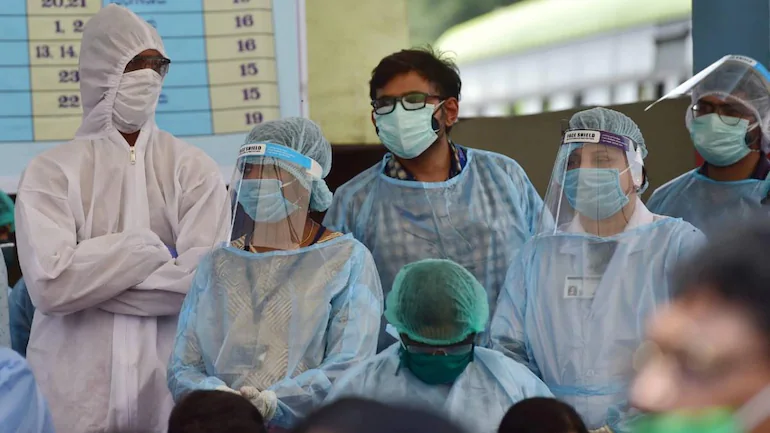Bengaluru, Jan 14: Karnataka on Friday reported 28,723 new cases of COVID-19, including 20,121 in Bengaluru Urban, as it recorded the highest number of tests since the beginning of the pandemic at over two lakh.
There were 14 new fatalities (Bengaluru - seven), the Health Department said in a bulletin.
"Highest testing since the beginning of pandemic with 2.21 lakh tests today," State Health and Medical Education Mnister K Sudhakar tweeted on Friday.
Positivity rate stood at 12.98 per cent in the State, where there were 1,41,337 active cases, including close to 1.01 lakh in the city.
Sudhakar said although the cases are increasing by the day, only about five to six per cent are getting hospitalised.
"However, it is a matter of concern that nursing staff are getting infected. So we should not be complacent as it may overwhelm our health infrastructure", he said.
Experts have opined that the third wave in the State may peak by February first week and start receding by third or fourth week of next month, according to him.
Noting that week-end restrictions have been enforced from last week, the Minister said: "We can't expect the infection to reduce in seven days. In the first two waves we needed at least 14 days to break the chain. It is lesser in this wave, but the infection is spreading 5-6 times faster".
"We will get to see the result of week-end curfew in the next few days", Sudhakar added.
To view today's health bulletin: CLICK HERE
Let the Truth be known. If you read VB and like VB, please be a VB Supporter and Help us deliver the Truth to one and all.
Panaji (PTI): As part of a crackdown against tourist establishments violating laws and safety norms in the aftermath of the Arpora fire tragedy, Goa authorities on Saturday sealed a renowned club at Vagator and revoked the fire department NOC of another club.
Cafe CO2 Goa, located on a cliff overlooking the Arabian Sea at Vagator beach in North Goa, was sealed. The move came two days after Goya Club, also in Vagator, was shut down for alleged violations of rules.
Elsewhere, campaigning for local body polls, AAP leader Arvind Kejriwal said the fire incident at Birch by Romeo Lane nightclub at Arpora, which claimed 25 lives on December 6, happened because the BJP government in the state was corrupt.
An inspection of Cafe CO2 Goa by a state government-appointed team revealed that the establishment, with a seating capacity of 250, did not possess a no-objection certificate (NOC) of the Fire and Emergency Services Department. The club, which sits atop Ozrant Cliff, also did not have structural stability, the team found.
The Fire and Emergency Services on Saturday also revoked the NOC issued to Diaz Pool Club and Bar at Anjuna as the fire extinguishers installed in the establishment were found to be inadequate, said divisional fire officer Shripad Gawas.
A notice was issued to Nitin Wadhwa, the partner of the club, he said in the order.
Campaigning at Chimbel village near Panaji in support of his party's Zilla Panchayat election candidate, Aam Aadmi Party leader Kejriwal said the nightclub fire at Arpora happened because of the "corruption of the Pramod Sawant-led state government."
"Why this fire incident happened? I read in the newspapers that the nightclub had no occupancy certificate, no building licence, no excise licence, no construction licence or trade licence. The entire club was illegal but still it was going on," he said.
"How could it go on? Couldn't Pramod Sawant or anyone else see it? I was told that hafta (bribe) was being paid," the former Delhi chief minister said.
A person can not work without bribing officials in the coastal state, Kejriwal said, alleging that officers, MLAs and even ministers are accepting bribes.





